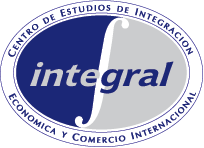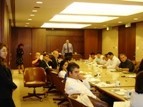Knowledge as a pathway to progress
INTEGRAL has active participation in the implementation and development of projects, which are classified into two large groups:
- Trade-related projects, with financing from international cooperation funds
- Projects for which funding is being sought
INTERNATIONAL COOPERATION PROJECTS
Trade related projects with support of international cooperation funds
– EuropeAid Frame Contract 127054/C/multi, for Latin America, Lot 10: Trade, Standards and Private Sector and Lot 11: Macro-economy, Statistics and Public Finances. INTEGRAL, through an institutional Memorandum of Understanding with EQUINOCCIO, has participated in twelve technical areas of the bidding process, which was awarded.
INTEGRAL was invited to participate in the following lots:
- Lot 10, which includes topics such as trade policy development and reform, support for trade negotiations, regional economic integration; Conformity assessment covering Sanitary and Phytosanitary issues and Technical Barriers to Trade, Intellectual Property, Trade in Services, Competition Policy, Trade Promotion and market strategy analysis and development. Private sector development policy and reform, SMEs development policy, Investment promotion, Support for Small and Medium Enterprises, commercial banking, corporate governance issues, Professional / commercial / advisory support.
- Lot 11, which includes macroeconomic analysis, Debt issues, Economic growth, Poverty analysis, National statistical systems, Performance measurement and monitoring. Evaluation, diagnosis and reform of public financial management, including the PEFA (Public Expenditure and Financial Accountability) framework, Audit, Revenue, Budgeting, Public Procurement and Public sector accounting system.
– Technical Assistance to Foreign Trade in Colombia, ALA/2007/019-005, in which INTEGRAL cooperated with EQUINOCCIO y GFA in the project aimed at providing technical assistance services to improve mechanisms to address the non-tariff barriers faced by Colombian exports and to improve the negotiation capacity in relation to investments and technical advances under competitive conditions through the creation of institutions, the stimulation of productive investment, the improvement of quality, the elimination of technical barriers to trade, and the respect for intellectual property and competition rules and related issues.
– Evaluation of the implementation of the EU-Mexico Free Trade Agreement and an assessment of the possible modernization of the agreement. INTEGRAL worked in partnership with Ecorys Nederland BV in the contract to carry out an evaluation of the implementation of the EU-Mexico Free Trade Agreement (FTA) and an assessment of the possible modernization of this Agreement. This study was implemented over the course of 2014-2015 and was completed by the beginning of 2016. All important information concerning the project can be found on this website.
PROJECTS FOR WHICH FUNDS ARE BEING RAISED
RESEARCH PROJECTS RELATED TO TRADE POLICY
- IPRLACC Project: under the Working Group on Trade and Intellectual Property Rights responsibility, as an extension of the IPR-Trade-LACC Project and within the Program for the Creation of Trade and Intellectual Property Capacities. The purpose of the IPRLACC – Intellectual Property Rights and Health Policies in Latin America and the Caribbean – is to investigate the interrelationship between intellectual property rights national laws and the pharmaceutical sector regulatory health requirements in selected Latin America and Caribbean countries, with the purpose of identifying the main sources of conflict within national legislation and formulating the public policy recommendations that should be developed to address them.
- Good Practices in Trade Policy Formulation: The project consists of producing a comparative analysis of the trade policy of several Latin American and Caribbean countries and identifying the institutional and instrumental factors associated with their efficiency and performance and developing a decalogue of good practices in the formulation of trade policies. It is expected to reveal the reasons why the same model works differently in each of the countries, taking into account all the factors involved in each case and recommending actions to achieve better performance.
ECONOMIC DEVELOPMENT AND SOCIAL INCLUSION PROJECTS
- ACOIS Program ((Analysis and Creation of Opportunities for the Social Inclusion of Vulnerable Populations in Developing Countries): protection mechanisms in developing countries are not working properly, taking into account the improvement achieved in their economic growth indicators. A persistently unfavorable indicator is the existence of large segments of vulnerable population, including children and adolescents. When there are high levels of marginalization and poverty, poor socioeconomic conditions are frequently associated with the appearance of criminal behavior. The objective of the ACOIS Program is the design and implementation of institutional social protection networks for developing countries vulnerable segments of population, in order to enable their access to the labor market and their insertion / reintegration into the community, creating a spillover effect that favors the local performance of the program. It is based on the need to promote social progress by promoting the efficient use of resources to directly benefit the most vulnerable groups, marginalized women and children, providing life alternatives that protect them from crime and violence. The program is based on the premise that public policies aimed at remedying this situation should incorporate a correct diagnosis of the social and institutional environment, in order to identify and quantify the core of the problem, but also ensure the existence of institutional capacity to design and implement the most appropriate solutions. The program will provide a framework to promote actions aimed at preventing specific risks in developing countries, such as the risk of prostitution and sexual exploitation; food risk, risk of family violence, health risks – by identifying them and progressively eliminating risk situations through the development of adequate institutional mechanisms and actions of the public and private sectors, with a result that will favor social welfare.
EMPOWERMENT OF MINORITIES AND MARGINALIZED POPULATIONS IN SOUTH FLORIDA (USA)
- NUCLEO Program – Negotiating Skills for Underserved Communities, Learning Empowerment and Ownership, seeks to train South Florida underserved youth and young adults in a cultural and competent way. The main objective is to offer a base of negotiation skills and knowledge that can be applied to the various professional activities, as well as in the daily struggles that the target population must face. We believe that the ability to negotiate well and reach mutually beneficial deals is an important skill that very few naturally possess, but that can be learned with practice.
- ADELANTE Program – Advancing Diverse Entrepreneurial Leadership through Acquisition of Negotiation Techniques, which seeks to provide minorities, whether they already own a small business or want to set up their own small business or are interested in becoming entrepreneurs, the possibility of – through technical assistance, taking their business to the next level, with an emphasis on import and export. The program will develop leadership and promote economic access by connecting individuals from the underserved population with opportunities so that they can compete more effectively in the global marketplace.
Additional information can be requested from our Projects Department



